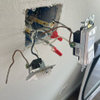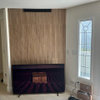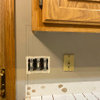Electrical inspection
fairfield8619
11 years ago
Related Stories

CONTRACTOR TIPSBuilding Permits: The Final Inspection
In the last of our 6-part series on the building permit process, we review the final inspection and typical requirements for approval
Full Story
CONTRACTOR TIPSBuilding Permits: The Inspection Process
In Part 5 of our series on home building permits, we explore typical inspection schedules for a variety of project types
Full Story
MOVINGHome-Buying Checklist: 20 Things to Consider Beyond the Inspection
Quality of life is just as important as construction quality. Learn what to look for at open houses to ensure comfort in your new home
Full Story
CONTRACTOR TIPSYour Complete Guide to Building Permits
Learn about permit requirements, the submittal process, final inspection and more
Full Story
MOVINGHiring a Home Inspector? Ask These 10 Questions
How to make sure the pro who performs your home inspection is properly qualified and insured, so you can protect your big investment
Full Story
LIVING ROOMSHow to Convert Your Wood-Burning Fireplace
Learn about inserts and other options for switching your fireplace from wood to gas or electric
Full Story
GREEN BUILDINGGoing Solar at Home: Solar Panel Basics
Save money on electricity and reduce your carbon footprint by installing photovoltaic panels. This guide will help you get started
Full Story
HOME TECHIs It Curtains for Curtains? Smart Glass Eliminates Window Coverings
Windows can now control light and heat through electricity and high-tech formulations, making blinds and shades optional
Full Story
BATHROOM DESIGNHow to Settle on a Shower Bench
We help a Houzz user ask all the right questions for designing a stylish, practical and safe shower bench
Full Story
MOST POPULAR15 Remodeling ‘Uh-Oh’ Moments to Learn From
The road to successful design is paved with disaster stories. What’s yours?
Full StoryMore Discussions









hexus
bus_driver
Related Professionals
Lexington Electricians · Ashburn General Contractors · Del Aire General Contractors · Fort Salonga General Contractors · Great Falls General Contractors · Jackson General Contractors · Jeffersonville General Contractors · Downers Grove Solar Energy Systems · Hinsdale Solar Energy Systems · Muscatine Solar Energy Systems · Annapolis Home Automation & Home Media · Ashburn Home Automation & Home Media · Massapequa Home Automation & Home Media · Plainview Home Automation & Home Media · Weatherford Home Automation & Home Mediafairfield8619Original Author
Ron Natalie
fairfield8619Original Author
Elmer J Fudd
fairfield8619Original Author
greg_2010
hexus
brickeyee
fairfield8619Original Author
greg_2010
fairfield8619Original Author
brickeyee
greg_2010
mike_kaiser_gw
brickeyee